Home Assistant Integration
-
@Lyr3x that did the trick, thanks!
The integration is working well, can I do anything to test it for you? -
@nikscha thanks
 will let you know! Of course if something is not working as intended don’t keep it to yourself.
will let you know! Of course if something is not working as intended don’t keep it to yourself. -
Configflow is still giving me a headache. I need to refactor the code more to get this working properly.
But I added a home assistant service to send gcodes:service: duet3d_printer.hevors_send_gcode data: gcode: G28Feedback appreciated!
-
@Lyr3x Hmm now it doesn't work anymore^^
I updated the integration though HACS, and after a restart the integration was gone from the integration panel. Didn't make any other changes. How can I debug this? Logs are empty too
-
Edit: Alright, I just released a new version of the integration. ConfigFlow is now working as well as the service. The binary sensor is still dead. You need to remove the configuration from your
configuration.yamland just setup the integration via UI. I unfortunately need to ask you to reconfigure the Integration later again, because I want to attach the entities to a device. But its in a working mode now! Please do not hesitate with feedback.@nikscha Yep realized that as well, sorry. I decided to stop trying to patch the stuff I want to remove anyway and fix the config flow setup and remove the configuration.yaml code completely. I already have a working unpolished state. Bear with me a little more. Ill update you all here later!
-
@Lyr3x No worries! It's working now, config flow as well. I suggest naming the fields in the config flow. I tried doing this myself and creating a pull request but honestly I am just not that good at Python ^^
I also tried making a textfield card to send typed Gcodes, but I also gave up and instead asked for help hereI also tested some gcodes, most of them seem to work just fine but I noticed a strange delay when sending a M291 P"X" R"X" S3. This doesn't happen with S2, S1 or S0. Maybe this is intentional behaviour? Sending the same command from within DWC returns instantly though.
-
@nikscha what do you mean with naming the fields? They all have labels
I’ll test the gcode tomorrow and see if I can find out what causes the delay!
-
@Lyr3x The fields are prefilled, but it doesn't say what should be in there. This is what it looks like with the prefilled values removed:
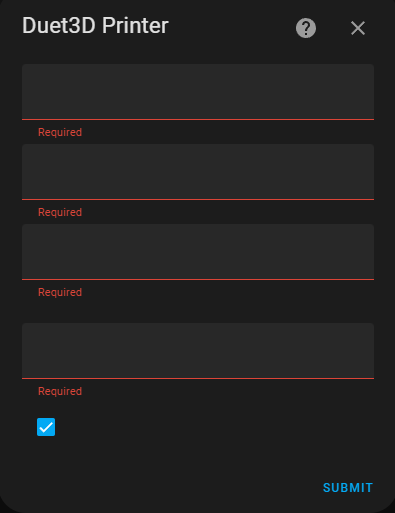
What does the checkbox do for example?
Looking at the code I can figure out its the field "has_bed", and I think that should be mentioned in the config flow as well -
@nikscha Interesting. That is not what I see here
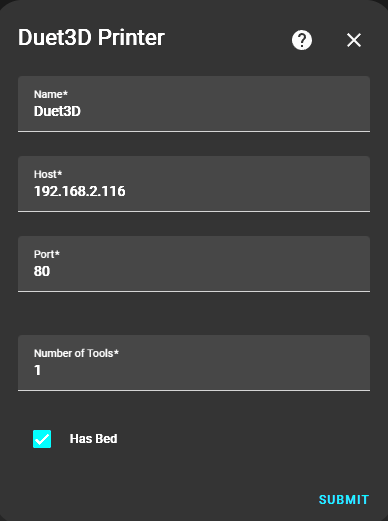
Did you remove the integration completely once?
Yeah, the checkbox is the check if you have a hotbed or not -
@Lyr3x Hmmmm

Not that I know of. Do you want me to test it? -
@nikscha Yep do that, maybe there is something cached from previous iterations. I tried that for you on a fresh local installation. Labels are working as intended

There is also no delay here with M291 P"X" R"X" S3 or any other GCode. It's exactly the same as with DWC
-
@Lyr3x That did the trick, the fields are now named.
The delay is still there tho.
Are you using a SBC?
Nvm I think I just communicated badly.
By "delay" I don't mean the time until the window pops up on DWC, but they time it takes HASS to aknowledge the service call. When callingservice: duet3d_printer.send_code data: gcode: M291 P"X" R"X" S3from the service tab in dev tools, it takes about 5-10 seconds for the 'call service' button to turn green. This isn't the case with other gcodes.
-
@nikscha said in Home Assistant Integration:
service: duet3d_printer.send_codedata: gcode: M291 P"X" R"X" S3
Ah gotcha. That is specific to the API call. It seems to be synchronous or it times out. If you press the
OKbutton, the request is done. The integration does not validate the GCodes but just send them to the DSF API. If you make a similar call via curl you see the exact same behavior. -
@Lyr3x Yeah that makes sense
-
Edit 4: With v0.1.1 standalone mode is fully supported and so are multiple tools. I also implemented proper setup to prevent duplicated integrations for the same board, so multiple integrations are support now as well.
Edit 3: We are on v0.0.5 now. Added experimental standalone mode. Can’t test it because I am only using SBC.
Edit 2: Released v0.0.2. All sensors are created properly and getting async status updates every 5 seconds. Ill follow up later to make the interval configurable and I also need to take another look at finishing up the setup when the printer becomes available later
Edit 1: Introduced a bug in the version so that the state is not always updated properly. Working on it

Hey folks!
I refactored quite a lot and we now have a proper integration between the DSF and Home Assistant. When you create the integration via ConfigFlow you have some options you can choose from, including the option to add an LED controller, which is handy if you have LED's connected to your Duet.
The Device itself represents the physical Duet board and shows your correct model as well as the firmware version. All entities now have unique id's and should not conflict anymore. All sensors, binary sensors and the send_gcode service should work properly now
Keep in mind that if you have the integration already installed, you need to remove the integration once more and install it again. That is necessary, because I have rewritten the way of how entities are registered in Home Assistant.
You'll find all infos here in the first release: https://github.com/Lyr3x/hass-Duet3D/releases/tag/v0.0.2
@dc42 it would be nice if we can upload the Duet3D logo here: https://github.com/home-assistant/brands/pulls - we can use the logo then with this integration.I'll look for a better solution for the
Positionsensor soon.
If you find any issues are need additional sensors, please create a GitHub issue from now on:
https://github.com/Lyr3x/hass-Duet3D/issuesI am also more then happy to accept PRs
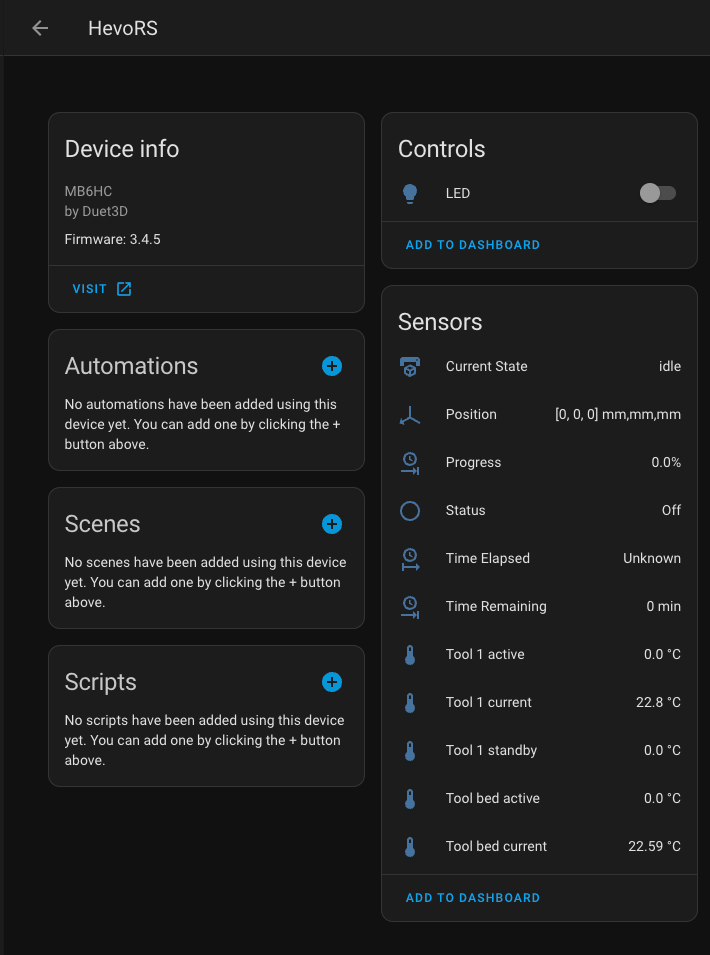
-
@Lyr3x Working well so far, many thanks for your efforts!!


-
Thanks, @T3P3Tony, for the support with the Logos. The integration now appears with a proper icon and the logo!
Unfortunately, I was forced to update the
DOMAINobject one last time, which results in the situation where everyone needs to re-install the integration completely. Sorry for that! Will try to avoid future breaking changes
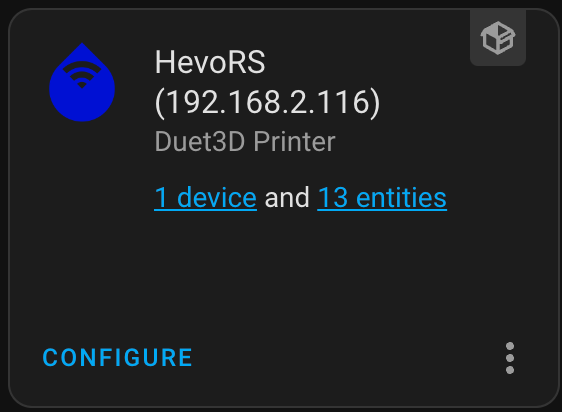

-
Thanks @Lyr3x for your work.
I have worked on porting the octoprint card to work with you integration.
Anyone interested can check it out here : https://github.com/repier37/ha-duet-card/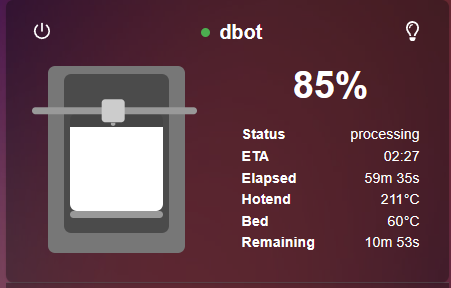
It has not been tested much besides on my setup, so feel free to report any issues.
btw, @Lyr3x to make your integration work on my setup I had to add authentication. check the pull request if you like to integrate it. -
@Lyr3x Firstly, thanks for your work on this integration which I have now added to my HA instance. I've also just added an ESP32 based "node" to control things like LED lights as well as monitoring humidity and a few other things. I use ESP Home so it's nice that I can have these sensor as well as the sensors from your integration all showing up on the same card.
Some LED strip lights that I have installed will illuminate the lower part of my printer (Z travel is circa 600 mm). So what I'd like to do is set up an automation that will turn these lights on when the Z position is greater than (say) 200mm. What I'm unsure of is how to "extract" the Z position from the sensor.duet3d_position_x_y_z. I note that the state of this entity is in the format [n,n,n]. I can use entity state as a trigger for the automation but how would deal with the fact that it's the third value that I'm interested and the first two values are to be ignored? I've never had an entity with multiple state values so don't know how to deal with it.
-
@Lyr3x Further to the above, I've found a "hack" that'll do for now but I'm sure there must be a more elegant solution. My hack is to create a template sensor to "extract" the Z position as follows.......
- platform: template sensors: zpos: friendly_name: "Zpos" unit_of_measurement: "mm" value_template: "{{states('sensor.duet3d_position_x_y_z') .split(',')[2].strip(']') |int}}"It isn't pretty but it works and will do the job for now. I can use this new "zpos" sensor in my automation to turn on certain lights when the bed is at 200mm or more below the nozzle (and turn them off again if it's above).
-
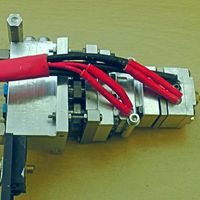 undefined deckingman referenced this topic
undefined deckingman referenced this topic